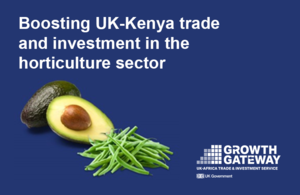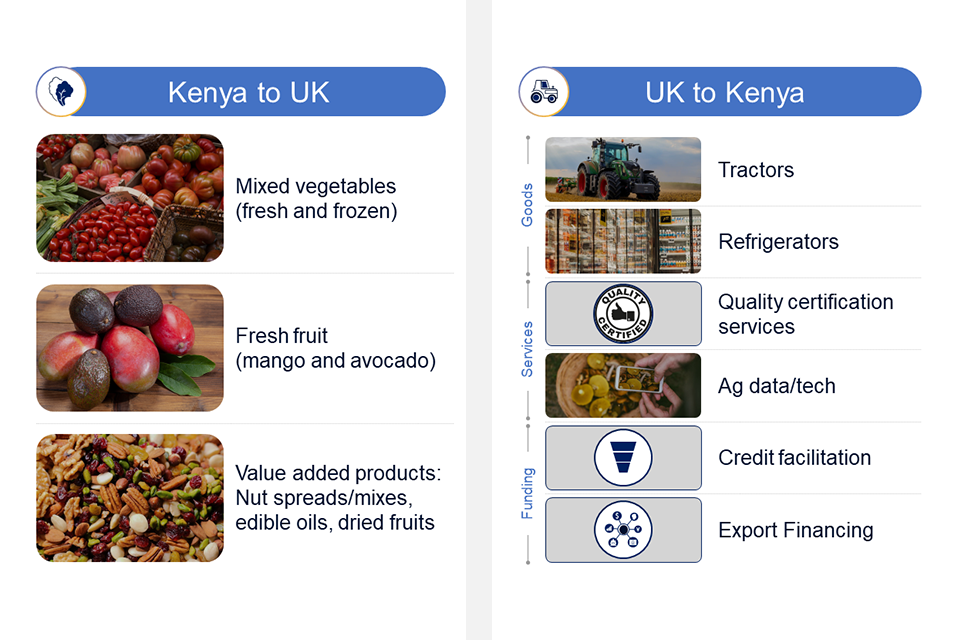Increasing UK–Kenya trade and investment in the horticulture sector
This joint project between the Growth Gateway and Trade Connect programmes focuses on how the UK government is supporting African exporters.

The Kenyan horticultural sector exports many high value products, such as vegetables, fruit and flowers, globally, including to the UK. The sector is vital for Kenyan smallholder farmer incomes, jobs, and foreign exchange, which support economic growth. As a major trading partner for Kenya, the UK imports Kenyan vegetables and flowers and supplies of finance and high-tech equipment. This 2-way trade is vital to Kenya’s horticultural sector, but it has been declining steadily since 2012.
Despite previously stagnant UK retailer prices and rising freight costs, Kenyan producers have struggled to deliver consistent quality and high volumes competitively. Poor trade facilitation, depreciation of the pound and uncertainty over post-Brexit food standards requirements have further reduced their market share.
Similarly, UK exports to the Kenyan horticultural sector including eg farm machinery have declined after competition from India, China, and Turkey. This is made worse because competitive credit terms have not been available for Kenyan importers.
This short project explored specific, high potential, horticultural value chains and identified products that could meet the demand of UK retailers and consumers. It also identified UK agricultural equipment, technology and services that could meet the demand in Kenya to optimise the productivity of horticultural value chains.
Horticulture exports from Kenya to the UK
The project considered major horticultural value chains, and reviewed 3 high-potential products that could have increased exports to the UK. The project engaged with major UK importers, buyers, and retailers of horticultural products to understand their buying criteria. It also looked at considerations British consumers made when shopping for fruit and vegetables. The 3 high potential products identified for targeted support are:
Mixed vegetables (cut and frozen)
The UK has a large export market for mixed vegetables, and Kenya is already a recognised supplier in the market. Kenya has existing large suppliers with the potential to scale up from current exports of £53 million to £120 to 150 million annually by 2030, and to generate many new jobs.
Fresh fruit
Kenya currently exports avocados worth £5 million annually but only has a low share of just 2% in a rapidly growing, health-conscious consumer market. By scaling up production of the right variety and quality of avocados, Kenya can potentially increase exports to £30 to 80 million annually by 2030. There is a smaller opportunity to enter the market for mangoes. Both fruits could generate large scale jobs for youth and vulnerable groups including women.
Value added products
The UK market for nut mixes and spreads, dried fruits and avocado oil is estimated to be around £650million annually and growing at 9 to 12% CAGR. This is driven by increasing consumer consciousness around health and wellness. With the right investment, opportunities exist for Kenyan SMEs to tap into this growing market.
UK goods and services exports to Kenya
The project identified 6 high potential areas across goods, services, and funding for boosting horticultural trade. It prioritised these based on UK competitive advantage, overall potential and development impact.
Credit facilitation and export finance
These represent the biggest opportunities for the UK to increase exports, and enable Kenyan agri-processors to buy British goods and services. Together, they could enable UK exports to the Kenyan horticulture sector to reach £1.5 billion by 2030.
Quality certification and agri-data/tech
These are other areas of UK comparative advantage. The Kenya horticultural sector could benefit by meeting UK certification standards and using technology to boost productivity and traceability.
Refrigerators and tractors
There is a smaller opportunity in refrigerators and tractors, due to UK price competitiveness challenges. However, allied technical services such as refrigeration engineering have strong potential.

Recommendations for increasing 2-way horticultural trade
During the project, the team engaged extensively with UK and Kenyan businesses, investors, government representatives and other stakeholders. These actions were identified as important to boosting the 2-way horticulture exports:
Horticulture exports from Kenya to the UK
- UK and Kenyan finance institutions should work with existing medium or large scale producers to help scale up large commercial or smart farms with supporting infrastructure. This will support reliably meeting the price, quality, and volume requirements of the UK market
- the Kenyan government should work with logistics businesses and UK and Kenyan finance institutions (for funding) towards addressing market and trade infrastructure bottlenecks (road access, cost of air freight, cold supply chain, port capacity). This will reduce the cost of production and help Kenya become price competitive
- UK and Kenyan finance institutions should help develop value-added products (shelf-stable products) and capabilities eg, processed or powdered vegetables that will not require expensive airfreight to the UK market
- the Kenyan government should designate certified processing zones. This will ensure high quality standards through robust quality checks for fruits like avocados aimed at exports to the UK and beyond
- Kenyan producers should work with UK retailers supported by the UK government to build on Kenya’s competitive advantages in Environmental, Social and Governance issues (water efficiency, labour standards, and social footprint). This will align with growing demands of UK consumers, investors and regulators
UK goods and services exports to Kenya
- credit facilitation: facilitate partnerships between UK and Kenyan finance institutions to provide subsidised interest rates for local businesses
- export finance: create wider awareness of UK Export Finance (UKEF) funding through marketing campaigns and information sessions
- quality certification: pursue strategic partnerships with Kenyan quality certification organisations to promote adopting UK certification standards locally
- agri data/tech: develop strategic partnerships with Kenyan agri-producers for shared benefits from improving productivity and traceability
- refrigerators: subsidise funding to help existing cold chain companies increase operations
- tractors: not a priority focus as UK tractors are less competitively priced for Kenya and do not meet the customer demand for smaller tractors
Achieving this potential will bring both development impact in Kenya and commercial benefits to the UK. It will require focused interventions, involving private sector players, and governments from both countries. Targeted matchmaking for businesses, sharing information, policy advocacy and development programme support can catalyse the development of a strong pipeline of transaction and deal opportunities. This will help to drive trade and investment in the horticultural sector. The Growth Gateway will facilitate this through targeted market engagement, business networking events and advisory support.
Find out more about support for African businesses to export to the UK.